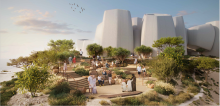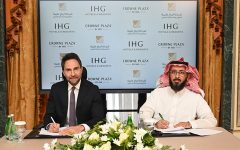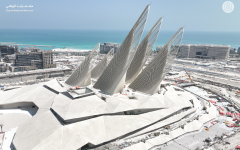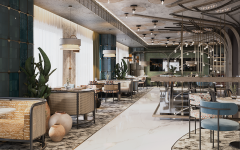 The Red Sea Development Company (TRSDC), the developer behind the world’s most ambitious regenerative tourism projects, The Red Sea destination and AMAALA, has revealed design plans for its state-of-the-art Marine Life Institute. Created by world-class architectural design firm Foster + Partners, the institute will function as both a scientific research center and a tourist destination. It will accelerate conservation-driven research, while offering visitors truly multidimensional experiences that bridge educational exhibitions with adventure-filled excursions. “We wanted to design a first-of-its-kind facility that extends far beyond any existing marine life attraction. With 10 zones that provide everything from augmented reality experiences to night diving, and spaces for the scientific community to effectively progress their environmental projects, the Marine Life Institute is undeniably unique. Not only will it drive global green and blue innovations, it will also help put Saudi Arabia on the map for travelers seeking trips that enrich their lives,” said John Pagano, CEO of TRSDC.
The Red Sea Development Company (TRSDC), the developer behind the world’s most ambitious regenerative tourism projects, The Red Sea destination and AMAALA, has revealed design plans for its state-of-the-art Marine Life Institute. Created by world-class architectural design firm Foster + Partners, the institute will function as both a scientific research center and a tourist destination. It will accelerate conservation-driven research, while offering visitors truly multidimensional experiences that bridge educational exhibitions with adventure-filled excursions. “We wanted to design a first-of-its-kind facility that extends far beyond any existing marine life attraction. With 10 zones that provide everything from augmented reality experiences to night diving, and spaces for the scientific community to effectively progress their environmental projects, the Marine Life Institute is undeniably unique. Not only will it drive global green and blue innovations, it will also help put Saudi Arabia on the map for travelers seeking trips that enrich their lives,” said John Pagano, CEO of TRSDC.
“The institute will live in the Triple Bay marina at AMAALA, but is the beating heart of our broader ambitions to protect and enhance the thriving Red Sea coast of Saudi Arabia. Through our expanding portfolio of projects we will share our valuable scientific discoveries with the world and enable our guests to experience the true beauty of our thriving coral reefs.”
Expected to host up to 650 people at any one time, guests will be able to walk underwater, snorkel with rare species, participate in lab tours and dive the depths of the Red Sea in a submarine. A testament to TRSDC’s coral farming operations, the facility will also be home to one of the world’s largest man-made reefs, measuring an astonishing 40 meters long and 10 meters deep and providing an epic “Grand Reveal” moment for visitors on arrival.
Integrating architecture with nature
Set within the AMAALA destination on the west coast of Saudi Arabia and located on the waterfront of Triple Bay, the 10,340 square meter institute will comprise three levels – one above ground and two below – and offer stunning panoramic views of the Red Sea and the marina.
Inspired by the Red Sea’s thriving coral formations, the glass-reinforced concrete that is being used to build the institute will be intricately molded to resemble reef patterns against the skyline. Inside, exhibition displays have also been integrated into the infrastructure, with visitors flanked by suspended semi-spherical tanks containing colorful local marine wildlife from the point of entry.
Gerard Evenden, Head of Studio at Foster + Partners, said: “The Marine Life Institute will take guests on a vibrant, educational, and awe-inspiring journey that unveils the natural wonders of the Red Sea and blurs the boundaries between the institute and the ocean. By recreating natural marine habitats, offering unforgettable marine interactions, and sharing glimpses into conservation projects, it will provide guests with an immersive marine experience unlike any other.”
Sustainably constructed
As part of TRSDC’s commitment to responsible development, more than 40 percent of the site will be covered by native plants, and a system to collect runoff water put in place to prevent erosion and pollution, while reducing mains water use. The lighting throughout the institute has also been designed with the company’s green ambitions in mind, with an innovative framework to prevent light pollution to protect the nocturnal environment.
“More than just a window into the marine world, we’re creating an integrated experience that offers unique activities for our guests, with a collection of opportunities to explore and learn suited to all,” said Warren Baverstock, Senior Marine Life Director at TRSDC.
“The overlay of sustainable design, build and operations, guest experience and meaningful scientific work underpins our commitment to drive enhancement of the environment and tourism growth. It’s a perfect model of sustainability, balancing people, planet and commercial success,” added Pagano.
Site preparation works have already commenced with bulk earthworks now complete and 170,000 cubic meters of soil transported. Next TRSDC will commence piling and shoring ahead of excavating 12m below the surface water level for the institute’s Grand Reveal aquarium.
The Marine Life Institute is part of phase one of AMAALA Triple Bay, which is set to welcome its first guests in 2024. Phase one of AMAALA – Triple Bay – is well underway and will consist of eight resorts offering upwards of 1,200 hotel keys. Upon completion, the destination will be home to more than 3,000 hotel rooms across 25 hotels, and approximately 900 luxury residential villas, apartments and estate homes, alongside high-end retail establishments, fine dining, wellness and recreational facilities.
 Tourism Breaking News
Tourism Breaking News


